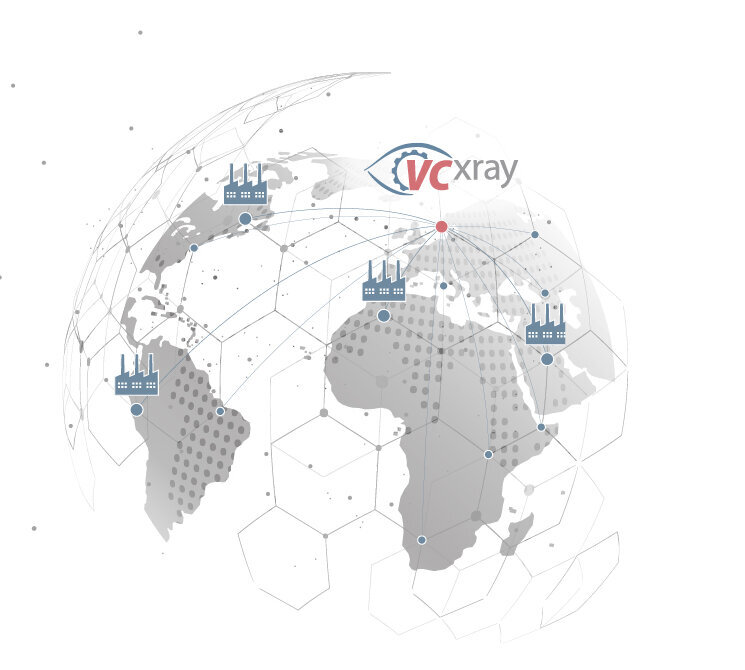
X-ray inspection systems for oil and gas industry
The oil and gas industry is of great importance to the modern global economy. It provides us with energy for power, heating, and transportation and has a significant impact on the global economy. The industry supports research and technology, but requires extensive infrastructure and has potentially negative environmental impacts. In light of the energy transition, many suppliers are looking for optimization potential in existing plants and the use of renewable energy to reduce dependence on fossil fuels. Nevertheless, fossil fuels will still play a very important role in the coming decades. Therefore, it is important to operate the infrastructure with maximum safety.
Materials testing in the oil and gas industry is crucial to ensure safety, reliability, and environmental compatibility of the equipment. It ensures that the materials used can withstand the extreme conditions and are corrosion-resistant. Testing drives compliance with regulations and standards, as well as the development of innovative materials. This prevents accidents, leaks, and pollution, and improves industry efficiency.
The use of X-ray technology and computed tomography (CT) plays an important role in materials testing in the oil and gas industry. These non-destructive testing methods allow detailed examination of materials and components without damaging them. Here are some areas where X-ray technology and CT are used in the industry:
Overall, X-ray technology and CT are helping to improve materials testing and quality control in the oil and gas industry, resulting in safer and more reliable equipment and ultimately improving the efficiency and performance of the industry.
Materials testing equipment in the oil and gas industry faces several challenges. They must be rugged and durable to withstand the extreme environmental conditions. They also need to be mobile and easily transportable for use on-site. Test equipment must provide non-destructive testing, be versatile, accurate, and reliable. Compliance with standards and regulations, operator training and efficient data management are other important aspects. Meeting these challenges requires close collaboration between manufacturers, industry, and research institutions.
Material testing results are critical to the safety and integrity of the equipment. Test equipment must therefore be highly accurate and reliable to provide reliable data. In addition, the oil and gas industry is subject to strict standards and norms regarding safety and quality. Test equipment must comply with these specifications and be capable of meeting the required standards. The employees who use the test equipment must be trained accordingly. The operability of the equipment should therefore be user-friendly and simple to ensure that the tests can be performed correctly and efficiently. An extremely important aspect is that the testing equipment must be able to efficiently manage and document the data collected. This is important to archive the results and make them traceable and accessible for later analysis and decision-making.
International standards for X-ray inspection of pipelines include ISO 17636 for the inspection of welds and EN 10246-7 for the non-destructive testing of steel pipes. These standards specify requirements and procedures to ensure reliable and safe X-ray inspection. The choice of the appropriate standard depends on the specific requirements and application.
API has developed standards for X-ray inspection of piping, including API 1104 for welding, API 5L for piping, API 5CT for casing and tubing, and API 570 for in-service inspections.
ASME has also developed standards for piping inspection. In particular, ASME Section V for general nondestructive testing is relevant to X-ray inspection. Furthermore, requirements for image format and archiving are specified. For example, the internationally recognized DICONDE format is often required.
These standards ensure compliance with industry guidelines and ensure reliable and safe pipelines in various applications. Due to the high demands placed on testing technology in this highly sensitive area, it is strongly recommended that an expert consultant be consulted.
The quality control requirements of companies in the oil and gas industry vary widely and can be roughly divided into several categories.
For in-service testing, companies need portable systems that can be used to test for corrosion or wear in the field. What matters here is a high degree of portability, robustness, and speed.
Particular importance is attached to testing components at the end of the manufacturing process. Suppliers who process smaller quantities need manual systems for testing small batches or individual inspections. Here, the ECO H-Series is the perfect system family for smaller components. Medium volume inspection needs require more automation of 2D inspection, CNC systems, and batch loading. Automated data processing becomes more important.
In the case of extremely high volumes, for example in series testing in the automotive sector, high-performance inline systems with automatic evaluation are required. In this way, the shortest cycle times can be achieved.
Another application is high-precision computer tomography for metrological or forensic applications. These measuring machines must be housed in an air-conditioned measuring room.
Choosing the right system can be complex, and a good decision must weigh many parameters such as size, speed, cost, etc. Contact our product specialists for further advice
Contact us today
Improve the quality and safety of your components with our state-of-the-art X-ray systems and CT systems. Contact us today to learn more about our material inspection solutions. Our team is always available to answer your questions and develop a customized solution for your needs.

With our Service centers and Hubs worldwide,
we will complete your staff with maximum
efficiency in your specified time frame and
without interrupting your operations.
No matter where you are, we are never far away.
Our knowledge and experience
maximize your company‘s profits.